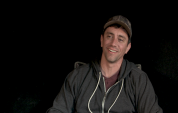5:34 | As he was waiting to board the big C-5 bound for Kuwait, John Christeson saw the space shuttle Columbia burn up on reentry. Not what you want to see before a long flight. The plane got the men of 1st Recon there safely, though, and he began to get used to his duties as an extra body in HQ platoon. Soon, he was staring at a very active night sky at the Iraqi border.
Keywords : John Christeson Reconnaissance (Recon) Iraq Space Shuttle Columbia Kuwait desert Headquarters Platoon FNG Iraqi missile chemical attack Mission Oriented Protective Posture (MOPP) suit gas mask rocket-assisted projectile (RAP) Lord of the Rings Nathaniel Nate Fick

It takes a lot of heart to become a Marine but it takes even more to become a Reconnaissance Marine. To endure the rigorous physical and mental challenges means you are one of the elite. This group of Recon Marines shares their personal stories of joining the Corps and how they came to Recon during a pivotal time in history. Part 1 of 3. (Caution: strong language)
John Christeson was born in Okinawa and moved around to various Air Force bases where his father was stationed. He had flying on his mind and made moves to get a West Point slot when the attacks on 9/11 changed everything. He needed to do something now.
He had run track in high school and found the physical training in boot camp to be a little less difficult than he'd imagined. John Christeson was also doing well in the School of Infantry when Recon came calling with a screening for potential trainees.
The first mission for John Christeson was scrubbed, a recon of a bridge that might be useful. He'd seen his first Iraqis by then, Bedouins in the desert who were much more peaceful than what he would soon encounter in the cities. First up, Nasiriyah.
In Nasiriyah, John Christeson watched a Huey and a Cobra bait the enemy into revealing themselves. It was that night that Jessica Lynch was rescued from captivity by a special forces task force. As he moved north from Nasiriyah, he began to see the real death and devastation.
Be on the lookout for Iraqi taxis. Apparently they were being hijacked and used for drive-by attacks. John Christeson never had that happen to him but he will never forget the moment he learned about muscle memory while reaching for another magazine. (Caution: strong language)
When John Christeson went back to Iraq for a second time, he was a real Recon Marine, having finished his training between deployments. As they prepared to cross the border and head for Fallujah, they were informed that every unit making that move had been hit with IED's, something they had not seen the first time around.
It was another platoon that got hit. They were ambushed while moving to a new HQ location and it had them pinned down with multiple casualties. John Christeson's platoon was the Quick Reaction Force and they immediately moved out but were stopped when command thought that it was too late to save them. As he sat there, it was the most frustrating feeling in the world. (Caution: strong language)
John Christeson was not a fan of the captain who was killed in the big ambush, but he died attacking into it just like you're trained to do. That incident and the killing of the Blackwater contractors signaled the beginning of the siege of Fallujah. (Caution: strong language)
His last deployment was a lengthy MEU float with many fun ports of call mixed with some serious operations in Egypt and Iraq. Then John Christeson was faced with whether or not to reenlist. They were making it easy for him to decide.
After he left the Marine Corps, John Christeson wasted no time. He did a little security contracting and finished college and then considered applying to the Marine officer program. He needed a hard-to-get waiver to do that.
Hollywood has not been kind to Recon Marines, often casting them as villains. That doesn't matter to John Christeson who was one himself. You need a little of the crazy killer in you to do that job. He is grateful for the opportunity, twenty years later, to get together with with those crazy guys once again.
As Operation Iraqi Freedom unfolded, the mission of the 1st Reconnaissance Battalion was to draw out Saddam's forces and engage them while larger bodies of troops moved on Baghdad. With one Recon platoon, a journalist was embedded who turned their story into a series of articles, a book and an award winning Hollywood production named Generation Kill. Part 2 of 3. (Caution: strong language)
They thought it was over. In 2003 the men of the 1st Reconnaissance Battalion stormed into Iraq during the initial assault. They returned home triumphant, mission accomplished. But then the word came that there would be an emergency redeployment. Saddam may be gone but the job was not finished and they were going to Fallujah. Part 3 of 3. (Caution: strong language)